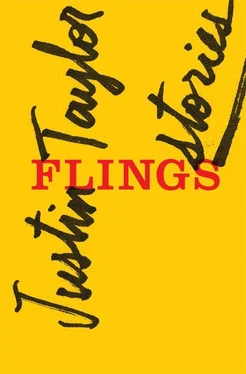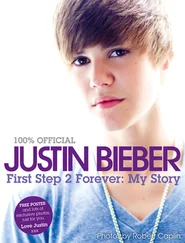Songs come and go. One opens with this long, sinuous guitar part that feels like walking through a curving tunnel and suspecting that the trail is doubling back on itself but not being sure. Then in a later part of the same song — he thinks it’s the same song, at any rate — there are these intervals where the band stops playing for two beats while the whole audience does these handclaps and then there’s this kind of chanting-wailing part — who knows what babble the lyrics are? — but then the lead singer’s voice is suddenly clear as a bell and he’s asking, hardly singing now, more like shouting, “Was it for this my life I sought?” and twenty-some-odd thousand people shout back at him, “Maybe so and maybe not!” Mike watches Ken, fist pumping in rhythm with the chant, screaming with what seems to be conviction. Mike can’t remember the last time he saw his son so excited about anything. Figures that the one thing that does it for him would be a declaration of existential uncertainty.
The guitar solo takes off like a bird, no, like a flock of birds, and Mike’s mind is adrift in the music, then away from it, the remainder of the set passing by as he thinks about a leather couch he saw at West Elm that he’s going to get for the condo he’s going to get after he unloads the house. Lori went with him and helped pick it out — the couch that is, though she’s also gone with him to see a number of properties. He’s almost made up his mind. Lori. Her downy face, wet eyes the same warm brown as the roots she lets show beneath her shock-blond hair. She likes smock blouses and matchstick jeans. Her favorite color is aquamarine. They met at a party on Mike’s friend’s yacht. She was pale in her bikini, somebody’s wife’s niece, drinking a screwdriver and standing alone. He imagines her in his new condo, a high-rise on the beach or pretty near it: A marble breakfast bar separates the living room from the kitchen, the leather couch they picked out sitting opposite a wall-mounted flat-panel TV. She’s in the kitchen in the morning in her panties and an unbuttoned shirt of his, rinsing the dregs of last night’s wine from a long-stemmed glass.
The ending of a song snaps him back to reality. The band starts up a new song but then they interrupt themselves a minute in so the lead singer can tell some kind of story while the drummer climbs out from behind his kit. It is revealed that the drummer is going to “play” a vacuum cleaner by sticking his face up to the hose part and letting it suck on his lips. Mike remembers teenage Ken raving about how cool it was that they did stuff like this; Mike himself always thought it sounded like second-rate Zappa gags and, seeing it live, now feels retroactively validated. The drummer is wearing a sleeveless polka-dot muumuu. The vacuum makes a sound like a dentist’s drill. When it’s over they play a couple more normal songs to close out the set.
The house lights go up and Angie says she’s going to go find the bathroom. Mike gives her forty bucks and tells her to pick up another round of beers on her way back. Mike watches Ken staring glassy-eyed at the empty stage. Christ, Ken. His long hair’s in a tight ponytail, fixed with an elastic band he borrowed from his sister; his pupils are like pits in the earth. Mike can see that Ken’s hair is starting to thin in front. Soon enough it’ll start to pull back. Mike’s never had much cause to think about this sort of thing. The men in his family do not, as a rule, go bald. This is the opposite of Miranda’s family — her father, her brother, all her uncles bare up top like someone reached in with an ice cream scoop. “Scalped,” Miranda’s brother, Derek, used to say with a laugh. Probably still says — just not to Mike. And baldness travels on the maternal gene, so that’ll be Ken before his thirtieth birthday, and it’s all his wife’s fault, and for once he’d like to say that out loud, fucking scream it, as if volume were the arbiter of truth, which, come to think of it, always has been the secret message of rock and roll. That and, of course, Never get old.
“Hey, Ken,” Mike says. “Can I ask you something?” No response. He tries again: “Ken.”
“Oh, hey, Dad, sorry, spaced there. Wassup?”
“Nothing, nothing. I just, well, I was wondering, do you know why Angie got so upset when you mentioned Brad?”
“Yeah, sorry, I shouldn’t have done that.”
“But why? He was your friend, wasn’t he?”
“I mean I guess so. But he tried to kiss her once, like not that long before he, you know.”
“I never knew that.”
“Well, duh, of course not. You’re the dad , Dad. I shouldn’t have said anything. I mean I wouldn’t have, normally, but I’m pretty—” He stops himself short, looks away from Mike, and wiggles his fingers stageward; this gesture, apparently, meant to complete the sentence.
“Hey, guys.” Angie’s back with the beers. She hands Mike his drink, which he takes, and his change, seven bucks, which he refuses. He tells her to put some gas in the car on the thirty-first. She shrugs and pockets the money. Ken raises his cup up and the other two move to meet his cheers.
“But what are we drinking to?” Ken asks.
“It’s your cheers,” Angie says.
“Shit, I dunno.”
“To new beginnings in the new year,” offers Mike.
“Sláinte!” Ken says, happy, his unsteady hand sloshing foam onto the floor. Angie stops her cup a moment shy of contact, deftly reverses course, takes a long drink instead. Mike feels his jaw clench. The house lights, mercifully, go down.
First song of the second set it happens: the guitar serves up that signature volley of notes that they heard in the car. Mike can almost see the smooth lines arcing through the air, like when you’re signing a contract and it feels like the pen has your name coiled up inside it and all you need to do is set it free. The stage lights turn the whole arena ocean-green and Ken’s on his feet, tiptoes even, doing a double fist pump, his instincts and faith in the world affirmed. Angie leans over, her rebuke to him from a moment ago already ancient history, forgotten; she’s wearing a grin about a mile wide now, shouting into Mike’s ear, “Dad! It’s your song, it’s your song!” Then she’s out of her chair also, arms and hips asway.
“Mike’s Song” blurs into the next song and then the next. Mike might be the only person in the whole arena still sitting in his seat. His beer’s in one hand, the other hand’s in his pocket, tracing a fingertip around the tiny rim of the camera lens built into his phone. He takes his phone out and looks at it. There are three texts from Lori. Three! He thought he’d set the thing to vibrate, but he hadn’t, and obviously he wouldn’t have heard the incoming-message bleep over the music.
The first message was sent fifteen minutes ago. It says, “hell yea come over im tipsy and undressed.”
The second one, sent thirty seconds after the first, says, “Hey shit sorry that was 4 jess. She’s with this girl dena we went to school with. Gotta get dressed now obvs hehe. Talk tmrw.”
Then, four minutes later: “Hope yr have gr8 nite with yr kids.”
Mike closes his fist around the phone, gets out of his seat, makes his way down the row, then the aisle, steps into the hallway, calls her — straight to voicemail. He hangs up on the outgoing message, wishing there were some way to delete the record of his missed call from her log. He goes back inside.
With the encore, set two ends up running about an hour and a half. So the whole show? Let’s say three hours. Mike, though long since bored with the music, is impressed by the value the Phish give for the money. He can see why they’re so popular; if this was your idea of a great night you’d probably feel like you got everything you came for and more. It’s late now. Angie offers to drive home but this time doesn’t insist. She lets her brother ride shotgun on account of its being “his turn” but really because she wants to stretch out in the backseat and fall asleep. Ken reclines his own seat, lolls his head back, and soon enough is sleeping, too. They’re back on the highway, northbound, the miles rolling by.
Читать дальше












